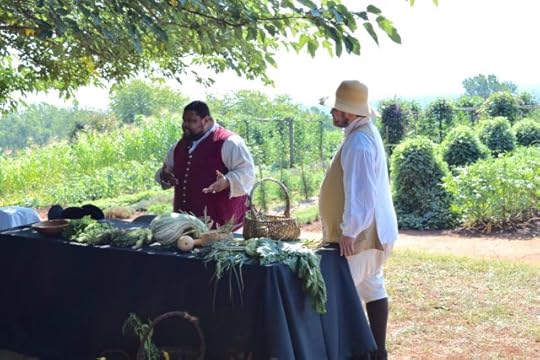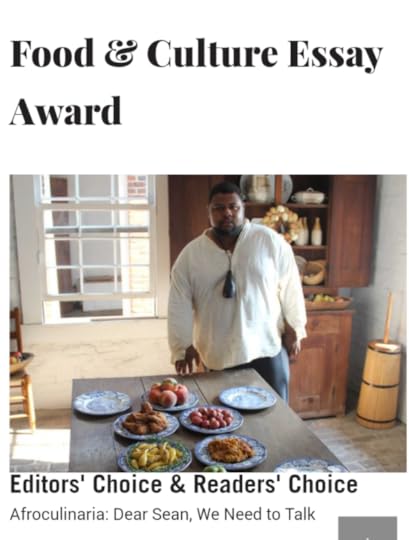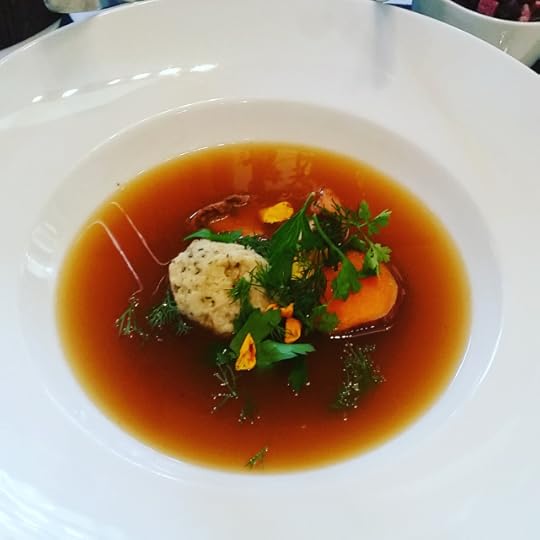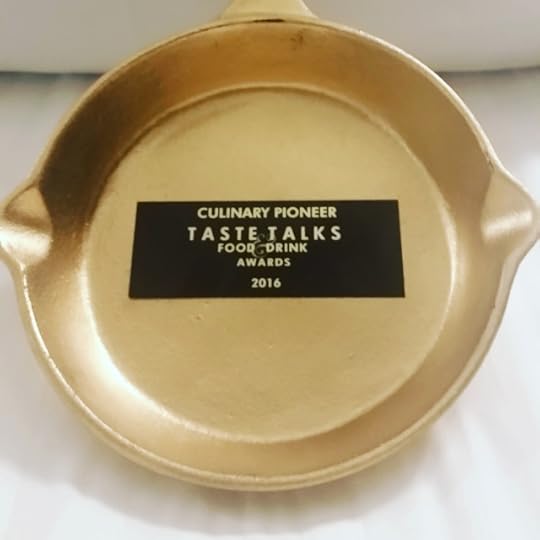Michael W. Twitty's Blog, page 10
December 21, 2016
Watch “Gastronomy and the social justice reality of food | Michael Twitty” on YouTube/My TED talk!
My #TED talk is up, watch it here! I’ve waited a long time for this, and I hope you enjoy it as much I shivered doing it
December 11, 2016
come see me Thursday night
http://www.mofad.org/events/2016/12/15/an-evening-with-michael-twitty
I’ll be at the Museum of Food and Drink in New York City!
12/15/16
There will be food! Get tickets ASAP!
Get your okra on!



October 5, 2016
Crops of African Origin or African Diffusion in the Americas
So–Some of you have come to me with the question about the African origins of crops found in the Americas. I want to give simple answers here so you have something at your fingertips.
Let’s talk about crops in the African Atlantic World—everybody is moving them around–Africans, Arab traders, Southeast Asian mariners, Europeans. Europeans move around certain crops as they create castle and fortress after castle and fortress on the coast to establish the trans-Atlantic slave trade. See Stanley Alpern’s work for solid documentation on each and every crop or foodstuff and how it was incorporated. Judith Carney has done excellent scholarship with her books Black Rice and In the Shadows of Slavery, complete with charts showing crops of African origin. Some foreign crops had been in Africa for so long that they diversified under the hand of Africans–like plantains and bananas, mangoes, and taro. By the time these crops arrive in the Americas, they arrive from Africa with Africans as part of the slave trade. There would be no American banana republics without first African bananas–and banana–is a word brought into European languages from Wolof, the main language of Senegal–a coastal nation and historically a major part of the slave trade. Coffee is a crop of African origin–from Ethiopia–and but there were coffee varieties across the Sahel and down into Central Africa–(Coffea stenophylla and C. excelsa) but no C. “Arabica,” in Brazil and Jamaica and Haiti without it first diffusing from Africa to Arabia and through the Levant to Europe, but Africans from across the continent knew what to do with it.
The yams of West Africa are not sweet potatoes, however sweet potatoes did fit well into cultures already used to relying on root crops. When Africans encounter sweet potatoes as enslaved people they utilized them in ways similar to tropical yams. Later, African varieties of sweet potato, like the Dahomey sweet potato, cross the Atlantic ocean and come to America. Millet, sorghum, guinea grass and other forage and grain crops make multiple appearances. Kola nuts and tamarind and varieties of oil palm may never have made it to the U.S. (as they did in Brazil and other parts of tropical Latin America) but they certainly became a later part of the economy through soft drinks, condiments, foodstuffs and industry. Rice comes over in both African and Asian varieties.
Because Africa was so prolific in its varieties of food crops and animals during this period–many foods became known as “Guinea,” or “Angolan.” Guineos–was a knickname for bananas in parts of Central America, the heart of the banana republic region. Guinea squash, guinea grass, guinea hogs, guinea pigs, guinea hens, Angolan chicken, Congo eels, you name it–different species were attributed–sometimes erroneously to Africa. No collards are not African, but they fit the bill in a diet much more in love with the year-round consumption of leafy greens than that of early modern Northern Europe.
There were also American crops and species that became important in West Africa through the time of contact through the period of slavery. Tomatoes, corn, peanuts, tropical fruits like papaya, pineapple, guava and avocado became incorporated in the West and Central African diet, on the terms of the adapters. Africa enjoyed incredible edible botanical diversity, incorporating crops from every corner of the world. Unfortunately slavery, political upheaval, and colonialism underminded the ability of most societies to sustainably feed themselves, and famine Africa was born.
Crops of African Origins in the Americas:
Sorghums, Grain and Sweet Lablab/Hyacinth Bean
Cowpeas/Black Eyed Peas Akee Apple
Burr GherkinsBurr Gherkins Cotton
Benne/African Sesame African Eggplant/Guinea Squash
Hibiscus/Sorrel/Roselle Jelly Melon
Amaranth spp. Bamana GroundnutBamana Groundnut
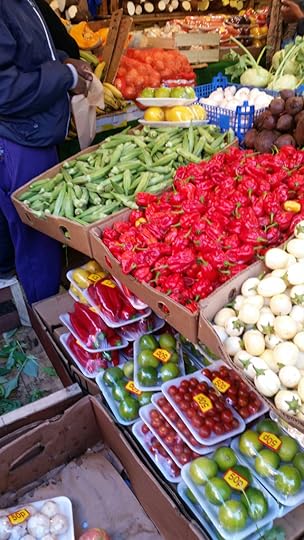
Crops of Asian or American origin diversified and naturalized in Africa introduced to different parts of the Americas with African cultivars:
Mangoes
Peanuts
Hot Chilies
Sweet Potatoes
Tomatoes
Sugarcane
Asian Rice

Animal varieties of African Origins in the Americas:
Camels
Cattle Egrets

IF YOU FEEL SO INCLINED, be sure to support our last bit of the fall drive. We just barely met our goal but could always use a few more ducats–see that shiny, golden donate button? PayPal us a little extra cash if you have it to spare–we love ya!


October 3, 2016
Happy Rosh Hoshanah/5777!
http://myjewishdetroit.org/2016/09/michael-twitty-a-kosher-soul/
I’m probably praying right now, but enjoy this piece by Vivian Henoch about my journey from My Jewish Detroit, it even has a link to a recipe. Happy New Year to my fellow Jews and to all Muslim friends everywhere as we both celebrate a new year!



October 2, 2016
African Ancestry Radio Debut
Chef Carla Hall (Top Chef, The Chew) and I were the first guests on African Ancestry Radio on Sirius XM! She’s awesome. She had her father’s African roots revealed on air. She is from the Bubi people of Equatorial Guinea of Bioko Island. She is also Yoruba on her mother’s side. These tests represent 7 generations into the past when Chef Hall’s ancestors stepped onto American soil in Virginia and South Carolina.
The Cooking Gene is coming to fruition. Next August 2017, everything will come to fruition. I am so glad that I’ve gotten so many culinarians to test for African roots and try to understand their own unique culunary abd historic path.Although Chef Carla was already tested with African Ancestry, I’m so glad I got to help Carla understand and contextualize her roots.
Self knowledge is powerful.
Please visit www.AfricanAncestry.com. Please visit Chef Hall here. Carl’s Southern Kitchen has all vegetarian sides!
 Chef Carla Hall, me and Gina Paige of African Ancestry
Chef Carla Hall, me and Gina Paige of African Ancestry
Representing the Bubi, Yoruba, Mende, Asante, Temne and Fulani peoples…among many others…
Happy Cooking!


October 1, 2016
This Historian Wants You To Know The Real Story Of Southern Food : The Salt : NPR
This just came out on Morning Edition on NPR. My friend, reporter Erika Beras interviewed me on top of Jefferson’s mountain after my Mulberry Row presentation at the 10th annual Heritage Harvest Festival. 95 degrees in period clothing-owww!
Enjoy!! (And share.)


September 30, 2016
Saveur Blog Awards Was a Blast!
As many of you know I was nominated for the category of Food and Culture Blog. 30,000 nominations across a dozen or so categories were whittled down to just a handful, and of 6 total finalists, your votes led to our being chosen the best food and culture essay.. In fact Afroculinaria won both Editor’s and Reader’s Choice for “the best single piece of food writing and cultural commentary.”
Thank you.
The challenge to this blog and to my work by certain members of the Charleston food media scene after the Eater piece by Hillary Drixler led to the essay, “Sean, We Need to Talk.” Contrary to the opinion of some ill-informed and culturally presumptuous writers, this is not a hip hop style “beef.” No “beef” exists between Homer Sean Brock and Michael William Twitty. I do however express little regret at challenging and hammering against the many micro-aggressions in a predominantly white food media that so often subjects foodies of color to extra scrutiny, misunderstanding and marginalization just because we are not “off the shelf” types. That’s not a Sean Brock problem in the least, that’s a systemic problem. So if I have a beef, it’s with a system that demands African American food writers and culinarians fit a tired old soul mold; questions our versatility and intellectual proficiency and outsources our story using it to upsell a vision of diversity that is empty and devoid of upward mobility and genuine community empowerment.
There is in the current food writing culture a massive shift in perception from where things were ten or fifteen years ago. Social justice is a key ingredient. Identity is a key to understanding the food voice of culinarians. Voice is a powerful concept in food politics. It was suggested by some in the Charleston food media that my voice was unfair, unwanted and unnecessary. I meant no harm to Charleston, my ancestral city, but as I have expressed, not one African American Charlestonian expressed dissent with my opinions and critique, but many more read the words of Chris Haire and others and were appalled and disgusted. Many people across all backgrounds encouraged me to stick to my truth. I appreciate all of them for their support.
It is critical that we assess and consider the authenticity of the connection between authors, chefs, jornalists and their matter of subject. Expertise, proficiency, connection to the communities we cook in and cook with, amplification of those without access to the same forums, and a spirit of selfless desire to empower our neighbors who struggle with issues of access, income equality, representation, and cultural and economic self-determination are the new commandments that accompany us into the kitchen. The degree to which the kitchen increases in its cultural and socio-political awareness and ethical imperatives and not merely in its trends, ingredients and hacks and techniques is the true measure of our culinary destiny.
I thank Saveur for these awards and thank my online community and family for their support. This is a journey we take together. I mean my voice only for the good. Sometimes we will be uncomfortable. Sometimes we don’t know how to proceed with this important, life-affecting conversation, but proceed we must.
Thank you. Everybody needs a place at the table. All food voices matter.


Watch “How to Succeed in Food Writing (by Really Trying) | Food for Tomorrow Conference | 2016” on YouTube
https://youtu.be/q2fEEiBwBok
Check this out!
Kim Severson of the New York Times interviewed me, the amazing Molly Yeh (Molly on the Range) and the brilliant Jenny Rosentrach (Dinner a Love Story) at Stone Barns last Tuesday on “How to Succeed in Food Writing (by Really Trying.” Please enjoy, LIKE and share!


September 27, 2016
And then this happened…
If you aren’t already familiar with TasteTalks make yourself familiar. It’s an amazing food site with tons of content that encompasses all of what the food world has to offer, from signature foods to weird foods from culinary masters to up and coming chefs to recipes and articles with cultural and historical context. They had their first TasteTalks awards at BAM (Brooklyn Academy of Music) and I was blessed to receive their first Culinary Pioneer Award! The incomparable Phoebe Robinson of 2 Dope Queens and Soooo Many White Guys interviewed me on stage and we had a blast.
Taste Talks Culinary Pioneer Award
The Taste Talks Culinary Pioneer Award honors an up and coming leader in the food world — someone that embodies the Taste Talks Food & Drink Awards values of culture, diversity and innovation.
2016 CULINARY PIONEER AWARD RECIPIENT
Michael Twitty is a culinary historian, historic interpreter, and food writer who aims to discover and bring to life the foods of his ancestors–enslaved African Americans in colonial and antebellum America. Michael’s research and interests also range into the wider African Diaspora, continental African food traditions, Jewish foodways, and heirloom and heritage breed foods and wild edible resources. As a growing champion of local eating in both the African American and Jewish communities, he actively reaches out to help all generations share the traditional knowledge that weaves beautifully with the the sustainable, eco-friendly principles of the locovore movement. Through writing, teaching, and cooking, he dreams of sitting all of us down at the “welcome table.”
I am ever ever ever so grateful
…………….
Time for a plug: We have a 500$ a season budget, which isn’t really enough to cover Dropbox and website and subscription costs, and costs for supplies and unexpected travel. We use this money to support and hire partners who do writing, art and research for the site. We buy books for the office library, we make coprs, do mailings, We are trying to close the deal. We have received a nice chunk of donations for this fall, but we still have a long way to go to meet our goal and hopefully exceed it.
In a time when people seem to thrive on celebrating the breakdown of civility and lack of respect for diversity, Afroculinaria wants sanity and unity. I use food to reunite us and to heal our wounds. We need your help to continue our mission. We do these drives to make sure we are at the ready to support the work of others in the field and being a beacon of light for those who need to be inspired and encouraged.
Please see our PayPal donate button on our full site page and donate what your budget and heart will allow. Or go on PayPal and send what you can to koshersoul@gmail.com. We are the only blog of our kind working towards healing, reconciliation, historical accuracy and heritage empowerment.
We love you and thank you for your support.
September 21, 2016
“One Bad Dude”
This is the piece I wrote for the Guardian on Terence Crutcher.
I have not been able to sleep since I learned about his shooting/murder. Sometimes I’ve just burst into tears, and I never met the man.
I’m just almost 40, a big guy, and Black. So maybe I have met him. 
It was edited for length and content but I also wanted to share with you the original “Last Testament.” I want to assure you I don’t ascribe to respectability politics, however knowing the triggers the mainstream media uses to snare Black victims of police overreach often face, I included everything I knew that would go against the stereotypes that are often used to condemn Black men and women to death, to claim that our lives weren’t as worthy of saving…expressed clearly or covertly. Know that I love you sisters and brothers, and we must work together to fight injustice. When I see white, Native, Latinx, etc. people being treated in similar ways I can’t help but think this is a backlash against an America that some don’t want to see take hold. We need to work together to end this as soon as possible. I’m scared…we are living in a time when water is not sacred and dogs are being sicced on Native children, when Black hands up doesn’t matter, when misogyny sells t-shirts, when poverty is aided and abetted by greed, when walls take precedence over understanding, and homophobia murders people in clubs. We need a healing. Now.
Anyway, please read the piece and reflect on these words:
Please everybody listen…
If they ever get their hands on me..
I will sit silently until it’s over. But if they kill me..
Please bear witness that I was not “one bad dude.”
Please fight for my character.
Remind them I loved to read and I loved to create community.
Tell them that I was never arrested or detained for a crime, never owned a firearm, and that despite her history, I loved the South.
Tell them I did not do drugs, abuse alcohol, and that I was a father to many, baby daddy to none, teacher of torah.
Remind them I was a teddy bear and not a beast to shoot.
Remind them I worked to do good things and that I wrote a book and that I was a quote on a Smithsonian museum wall, a TED speaker, that I quoted Shakespeare verbatim in front of an audience of 2000 in London, spoke at Oxford University, and that I touched the Western Wall twice and spoke at Yale 3 times.
Tell them I wasn’t “one bad dude,”
Tell them I was a strong, Black man.
#TerenceCrutcher #SAYHISNAME!


Michael W. Twitty's Blog
- Michael W. Twitty's profile
- 322 followers





